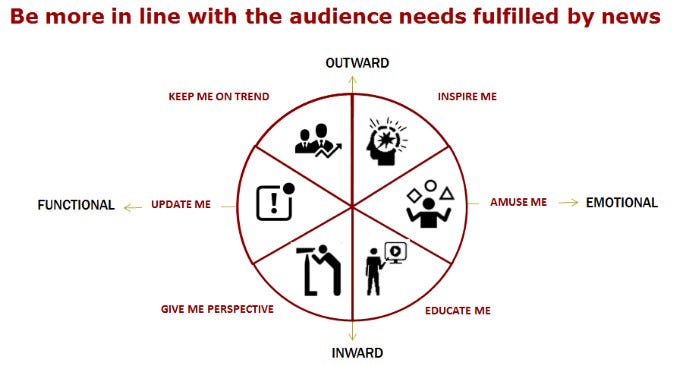⚡️ Dimple's Digital Digest: Q&A with content leader Dmitry Shishkin ⚡️
How do you capture - and keep - your audience's attention? 🤔
This week is a special interview edition as we meet award-winning independent digital consultant Dmitry Shishkin.
He reveals why user needs come first in content production, his reading list for everyone working in digital, how the BBC World Service transformed its online strategies to reach new communities, and what 2020 taught him - both professionally and personally.
Dmitry, tell us about your career path?
All my roles at the BBC had to do with innovation, audience development, audience engagement, and application of data.
My last job [there] was to develop 12 new language teams after the government gave funds to invest in foreign broadcasting. … We created around 350 digital specific roles - from Jakarta to Latin America and everywhere in between. Millions of people didn’t used to have access to BBC news in their own language - but now they have. We’re talking about people in Korea, India, Africa, Serbia... it was very rewarding to help achieve that.
Then I moved over to Culture Trip as a Chief Content Officer which sharpened everything that I loved. It was about content creation with very specific audience needs in mind, very in-depth collaboration with data teams, with product teams, with commercial teams. I now work for myself as an independent digital consultant and it’s fast becoming one of the best jobs I’ve ever had because you work with people who want change, who want your help, and who pay attention to what you’re saying.
At the BBC, did foreign language stories find an audience in the UK or were they hyper-local to countries?
It was always a combination of three thirds. The first third is central content that all language teams were publishing from English effectively. … Another third probably would be stories that were relevant to a region as a whole - for example, a team in East Africa could also use stories from West Africa and South Africa.
[The final] third were stories that were only generated by you for your own audience - it cannot be cascaded up to be offered to many other teams. So it was a wonderful combination of globally resonant stories as well as locally relevant ones.
What are some of the key elements needed in content to capture your audience’s attention?
Any organisation that is trying to engage people in a meaningful way needs to always start with one thing: user needs. Many people who create content think that they know the user needs better than the audience itself but that’s rubbish. You will never get proper engagement if you are outputting something people are not really interested in or you're doing it in a way that doesn't speak to them.
When I work with clients now, I always say let's go to the audience first, let's hear them, and only then we will decide strategy and tactics.
The truth is, people who have been building digital products have been talking about satisfying user needs since the beginning of the Internet - like when they were building websites to work better - and content people are only now waking up to this idea.
Can you give me an example of how to find out user needs?
I’ll tell you how we did it at the BBC World Service when we realised that the audiences globally were plateauing. [Our teams] asked people to keep a diary of everything they had consumed in terms of news in a week - asking them to keep URLs etc. And then we asked them to group the content they have consumed into blocks that make sense.
But we didn’t tell them what groupings they should be. And this was how the BBC came up with this brilliant idea of six user needs for news which I was fortunate enough to enforce globally.
Once you realise that people don’t only want to be informed by news but they want to be educated, they want to have perspective - that’s when you realise everything you’re outputting is wrong or the balance is not right. That’s why the intersection between content, data and product are so important - this is where magic happens.
Who or what do you admire for their content or social media?
I’m a very big fan of everything sports teams and associations do on social media. For example, the way they have been so inventive during coronavirus when they couldn't broadcast anything and they were going to their archives and creating very interesting things.
I think the way The Athletic, a sports publication, commission stories, the way they promote themselves, the way they do things across platforms - from their website to their podcast - is very strong. And the way they seek feedback for each article from their audience is great because it basically fuels their own content engine afterwards. They can see trends, what angles work, and what doesn't.

I know reading is a big part of your life. What are some books you recommend for someone starting off in content or digital strategy?
If you want to develop yourself within the realms of content/product cooperation and innovation and output, Measure What Matters by John Doerr - it was the book which was obligatory to read at Culture Trip for everyone who worked there. The Tyranny of Metrics by Jerry Muller is amazing, it’s almost an antidote to Measure What Matters - I recommend it to be read one after another.
I just read a really great book by David Rowan, the founding editor of Wired in the UK. He wrote Non-Bullshit Innovation - and innovation as a whole has a lot of buzzwords around it - but he wrote a book with lots of practical examples of how successful companies do innovation.
What do you think is the most misunderstood thing about social media?
Lots of people still have this notion that you just need to pump stuff out. And this is a painful thing to witness. [Also], one size doesn’t fit all, you can’t create [content] once and publish on 6 different platforms. I’d rather you be excellent on two platforms than have presence on 6.
What advice for you for someone wanting to get into social media?
Be inquisitive! Never stop learning. You don’t need to be trained as a video journalist to create wonderful videos - there are plenty of tutorials online. And if you're working in social media, you need to be spot on with your data and analytics skills - so get hands-on Excel or spreadsheet training.
And finally, 2020 was a hard year professionally and personally for many. What do you think you learned from it?
I have learned that there is a great deal of kindness in the world. The way people have been supportive of my family and I in the last year, you want to give back.
It was the hardest year of my life - both personally and professionally (as it was for many other people, too), but what I learned is that if you have certainty about where you want to go and what you want to achieve, and you work smart towards it - and if you always try to be helpful to others - the universe will deliver.


